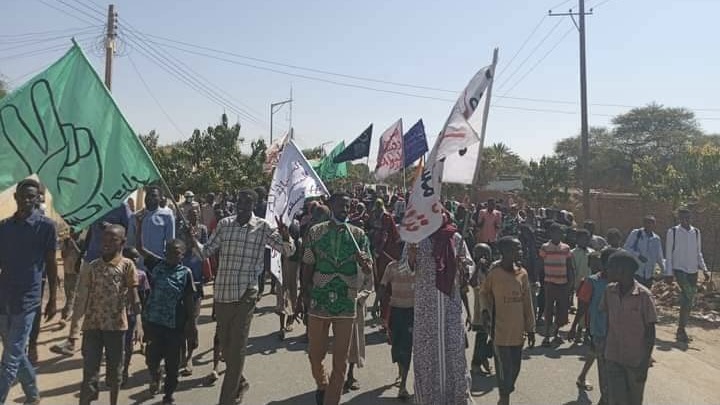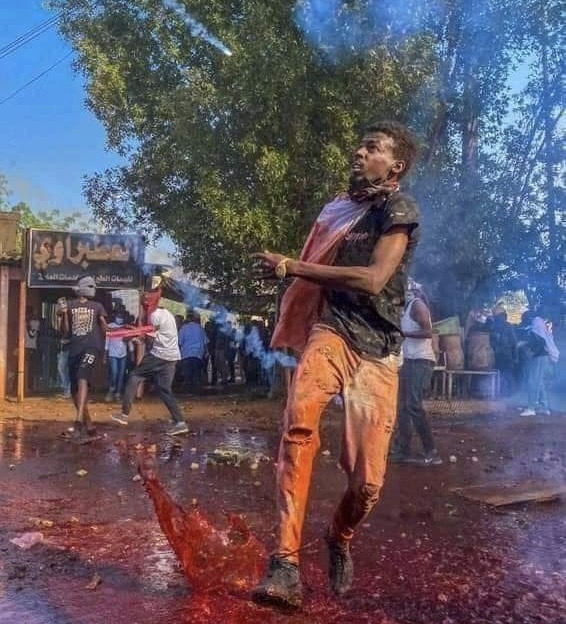Amidst this country-wide civil rebellion, the military junta is speedily moving to reinstate the Islamist regime led by former dictator Omar al Bashir, who was ousted in April 2019

On Sunday, January 30, mass demonstrations against the military junta in Sudan saw hundreds of thousands of pro-democracy protesters take to streets in at least 25 cities and towns around the country, for the 16th time since the coup on October 25, 2021.
Protesters have blocked the Sudan-Egypt border and several connecting highways to disrupt trade with the northern neighbor, whose government is known to be supporting the junta. Further a critical bridge on the highway connecting capital Khartoum and Port Sudan on the Red Sea has also been blockaded.
The security forces violently attacked the protesters on Sunday, injuring at least 180 people with the use of live bullets and tear gas canisters which were shot directly at their heads, the Central Committee of Sudanese Doctors (CCSD) said in a statement on Monday.
In central Khartoum, where the junta has banned demonstrations, the security forces opened fire on rallies converging from various neighborhoods towards the presidential palace, which is the seat of coup leader and army chief Abdel Fattal al-Burhan.
27-year-old Mohamed Yousif Ismail died in this attack by security forces after succumbing to chest trauma. “The nature of the injury is yet to be identified. The death toll among civilians has now risen to 79 since the military coup,” the CCSD said.

Ismail was a member of the Resistance Committee (RC) in the Wad Nubawi neighborhood in Khartoum’s twin city Omdurman. He was a representative of his committee in the Omdurman coordinating body of the RCs.
The mass resistance against the junta is being spearheaded by a network of RCs that were organized in neighborhoods across Sudan during the course of the December Revolution. Later in the evening on Sunday, hundreds attended Ismail’s funeral service and hailed him as a martyr and vowed to continue the struggle. “[E]ven if you kill the entire Sudanese people, you and your dogs will not rule us,” the RCs of Khartoum’s Al Kalakla Al Gubba neighborhood said in a statement addressing Burhan.
Forces also attacked the mass demonstrations in several other States and arrested the protesters, including in Red Sea, Kassala, Gedaref and Blue Nile. Protesters in several cities barricaded neighborhoods to defend from the attacks by the security forces who invaded residential areas.
A police captain reportedly had his fingers amputated after a stun grenade he was hurling at protesters exploded in his hands.
Blockading trade with Egypt
A major escalation in the resistance has been the blockading of trade routes with Egypt in the three northernmost Sudanese States along the Egyptian border. In River Nile State’s capital city Ad-Damir and in Port Sudan in Red Sea State, critical roads used by trucks to carry goods to and from Egypt have been blocked for trade. An important bridge connecting Port Sudan to capital Khartoum was also blocked by the RCs in Atbara city in the River Nile State.
In the neighboring Northern State, the Sheryan El Shima road to the Egyptian border has been blocked by farmers protesting against further hikes in electricity tariffs since January 9. Though the decision to hike the prices was rescinded on January 12, the farmers and the RCs have continued the blockade demanding a fair share of the State’s revenues from mining and agricultural projects in these regions. They are also calling for disinvestment of military-owned companies from these projects.
“We will fully block the road between the two countries and stop the Sudanese exports to Egypt. Roads will be shut from both River Nile State and the Northern State, including the road linking Port Sudan with Khartoum to the south and with Egypt in the north,” the RCs announced earlier on January 30.
The nature of trade between the two countries is characterized by the export of raw materials including livestock and agricultural products by Sudan in exchange for imported valued-added goods from Egypt. This is perceived to be a reason for the rising prices of basic commodities in Sudan and a shirking market in the country for its native farmers.
Import reliance on Egypt has increased drastically over the last two years, much faster than the rate of increase in Sudan’s exports. Value of imports from Egypt has increased from USD 172.3 million in the first six months of 2020 to USD 419 million in the same period of 2021, while Sudanese exports to Egypt increased from USD 119.5 million to USD 299 million, Al-Monitor reported.
Widespread smuggling, allegedly undertaken with the connivance of the state authorities at the Sudan-Egypt border, is thought to be adding to the economic woes of the Sudanese people. The blockades are targeting not only the Sudanese state, but the Egyptian government for its perceived interference to prop up the military junta which has no domestic legitimacy.
Less than a month after the coup, on November 20, 2021, Egypt’s National Organization for Military Production signed a military industrialization cooperation agreement with Sudan’s Military Industry Corporation (MIC). Egyptian president Abdel Fattah el-Sisi then assured Sudanese coup leader Burhan of full support in a phone call on January 2.
A week after the highway to Egypt was closed by protesters in Sudan’s Northern State, Sisi said in his subsequent statements that Egypt is not backing the coup in Sudan. However, few believe that to be true.
Military junta racing to revive the former Islamist regime?
Since the coup, the junta has taken several measures to reinstate members of Bashir’s Islamist National Congress Party (NCP) who were purged from state structures after his ouster. With resistance to the junta intensifying, it now appears to be in a race against time to complete this process.
On January 24, amid country-wide demonstrations, the junta reinstated 100 civil servants who were removed from their posts in the Ministry of Foreign Affairs for their ties with the NCP.
They had been dismissed from their posts by the Empowerment Removal Committee (ERC) which was set up under popular pressure to purge elements from the NCP from the post-Bashir joint civil-military transitional government (dissolved since the coup).
On January 29, the Holy Quran Society, whose board was dominated by some of the senior-most members of the NCP and through which Bashir’s regime had “funneled millions of dollars” for Islamic radicalization, was reactivated. Its assets seized by the ERC “including a tv channel, 2 newspapers, real-estates and a gold mine” were returned, according to Nada Ali who is closely following the developments in Sudan.
Amid the protests on Sunday, 225 persons sacked by the ERC were reinstated to their former posts in the Zakat Chamber. Tasked with collecting taxes in accordance with Islamic law for the purpose of wealth distribution, this body was known to be among the most corrupt bodies under the NCP’s regime.
On Monday, the unlawfully obtained assets of senior NCP leader and former vice-president of Sudan under Bashir, Ali Osman Taha, were returned to him. These included two houses and a hundred thousand acres of agricultural land that were confiscated by the ERC. In all these cases, the judiciary has been used as an instrument by the junta to pass favorable judgements.
Protesters refuse negotiations with the military
Under these circumstances, calls by the UN as well as the US and its western and MENA regional allies for the pro-democracy movement to hold negotiations with the military have been met with outrage on the streets.
Turning down the invitation to meet with the United Nations Integrated Transition Assistance Mission in Sudan (UNITAMS), the RCs of Madani, capital city of El Gezira State, said in a statement last week: “So far, the international community has clearly supported the coup parties, including the European Union and UN entities, including the UNATIMS mission, and they are attempting to set the stage in order to tighten the coup’s military and security grip, whose brute power continues to harvest Sudanese lives.”
Reiterating that the Madani RC abides “by the decision of the revolutionaries that there is no negotiation, no partnership, and no legitimacy,” the statement urged “all the resistance committees to pay attention to the dangers of internal divisions and disagreements caused by such calls”.
Even as the security forces continued their crackdown and arrested around 65 RC members and other lawyers and activists by Tuesday, the coordinating body of RCs in Khartoum announced the ‘Revolution Timetable‘ for February. Country-wide demonstrations and rallies are scheduled on the 7th, 14th, 21st and 28th of this month.
Barricading neighborhoods, strikes, smaller demonstrations and various forms of civil disobedience will continue between these days under the leadership of the local RCs and unions. In the meantime, the RCs intend to continue the blockade of Sudan-Egypt roads up north till the fall of the military junta.
SOURCE ' /peoplesdispatch.org/
Social media is bold.
Social media is young.
Social media raises questions.
Social media is not satisfied with an answer.
Social media looks at the big picture.
Social media is interested in every detail.
social media is curious.
Social media is free.
Social media is irreplaceable.
But never irrelevant.
Social media is you.
(With input from news agency language)
If you like this story, share it with a friend!
We are a non-profit organization. Help us financially to keep our journalism free from government and corporate pressure












0 Comments